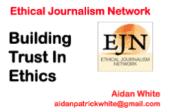|
|
Ethical Journalism News
|
EJN Director Accepted Position of Chair of the IMPRESS Appointment Panel
| The Appointment Panel will select the members of the Board of IMPRESS: the Independent Monitor for the Press, the press regulator which will be independent of newspaper owners and politicians. IMPRESS will regulate publications which believe in the importance of high professional standards, a complaints system free at the point of use and a truly neutral regulator. (via The IMPRESS Project) |
|
| When journalists cannot interview agency staff, or can only do so under surveillance, it undermines public understanding of, and trust in, government. This is not a “press vs. government” issue. This is about fostering a strong democracy where people have the information they need to self-govern and trust in its governmental institutions. (via The New York Times) |
|
NPR Learns About (New) Media Accountability – the Hard Way
| NPR is looking for a new ombudsman to replace Edward Schumacher-Matos who has held the post for the past three years. He steps down in September. The ad seemed perfectly boiler plate: “experienced journalist, knowledge of public radio, good communications skills, etc.” But two sentences in the original job posting stood out to close observers of the public radio world and to those who know how an ombudsman must function: The NPR Ombudsman/Public Editor focuses on fact gathering and explanation, not commentary or judgment. (via The Organization of News Ombudsmen) |
|
How Social Sleuthing Uncovered Evidence of Surface-to-Air Missile Systems in Eastern Ukraine
| While the investigation into the attack is likely to go on for an extended period of time, initial reports from the scene, gathered from several social platforms, provide insights into the crash and the location of a ‘Buk’ missile system in the separatist-controlled area prior to the attack. (via Storyful) |
|
| “Soft censorship,” including actions such as quiet dismissals, punitive tax laws, denied radio frequencies and abuse of privacy legislation, is arguably the most worrisome type. It creeps and grows in small increments and therefore often goes unnoticed until it has become institutionalized, at which point it is difficult to reverse. Over the past four years, Hungary has seen dozens of small, and not so small, encroachments on the right to free expression. (via IFEX) |
|
| On this, the 100th anniversary of the day the first world war began, it is sobering to look back at the way that conflict was so badly reported. The catalogue of journalistic misdeeds is a matter of record: the willingness to publish propaganda as fact, the apparently tame acceptance of censorship and the failure to hold power to account. But a sweeping condemnation of the press coverage is unjust because journalists, as ever, were prevented from informing the public by three powerful forces – the government, the military and their own proprietors. (via The Guardian) |
|
| The Australian Press Council has expressed “considerable concern” about coverage in the Australian of the Intergovernmental Panel on Climate Change’s assessment of global temperature rises, after upholding readers’ complaints of inaccuracies in some of the newspaper’s articles. (via The Guardian) |
|
Reports & Resources
|
| A short presentation by the EJN giving concrete steps on how to make ethics work in your newsroom.
|
|

|
|
|
|
Events & Workshops
|
| MEDIANE invites media outlets and their professionals to participate in European Exchanges of Media Practices (EEMPs). These exchanges intend to allow various media actors (journalists, media, journalism and media literacy trainers, regulatory body staff members, editorial managers, journalism students etc.) to strengthen and enlarge their competences and abilities on diversity and non-discrimination and exchange on inclusive and diverse modes of media design and production. Deadline to apply is September 15th, 2014. (via The Council of Europe) |
|
|
|
|
|